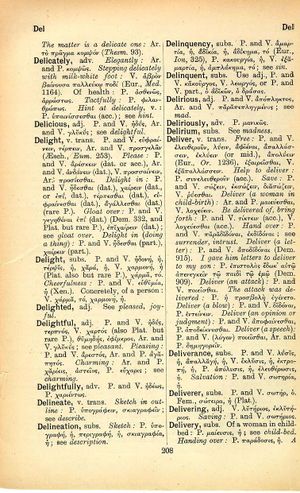delirium: Difference between revisions
From LSJ
τὸ ἓν καὶ τὸ ὂν πολλαχῶς λέγεται → the term being and the term one are used in many ways, one and being have various meanings, one and being have many senses
(2) |
m (Text replacement - "(|thumb)\n(\|link=)" to "$1$2") |
||
| Line 1: | Line 1: | ||
{{Woodhouse1 | {{Woodhouse1 | ||
|Text=[[File:woodhouse_208.jpg|thumb | |Text=[[File:woodhouse_208.jpg|thumb|link={{filepath:woodhouse_208.jpg}}]]'''subs.''' | ||
|link={{filepath:woodhouse_208.jpg}}]]'''subs.''' | |||
See [[madness]]. | See [[madness]]. | ||
Revision as of 17:15, 18 May 2020
English > Greek (Woodhouse)
subs.
See madness.
Latin > English (Lewis & Short)
dēlīrĭum: ii, n. deliro, no. II., in medical lang.,
I madness, delirium, Cels. 2, 8; 3, 18 et saep.
Latin > French (Gaffiot 2016)
dēlīrĭum, ĭī, n. (delirus), délire, transport au cerveau : Cels. Med. 2, 6.
Latin > German (Georges)
dēlīrium, iī, n. (delirus), als mediz. t. t. = das Delirium, das Irresein, Cels. 2, 6. p. 37, 12 D. u.a.

